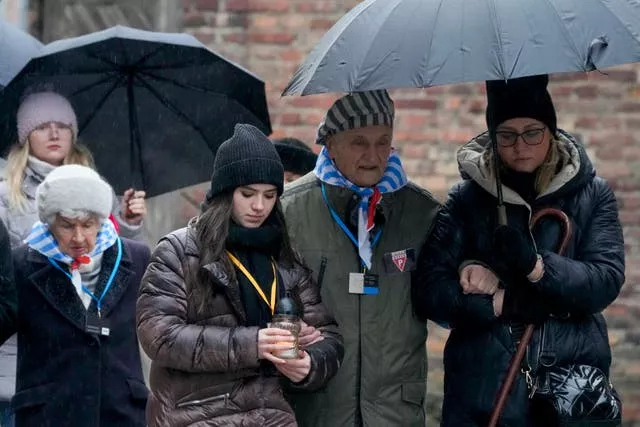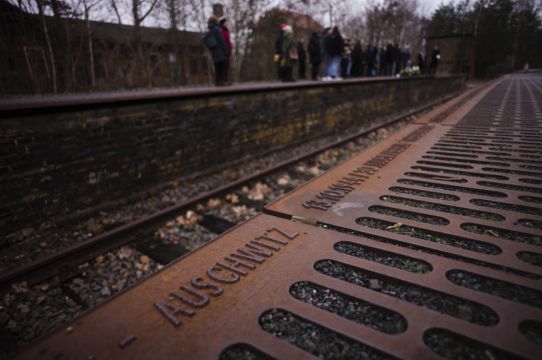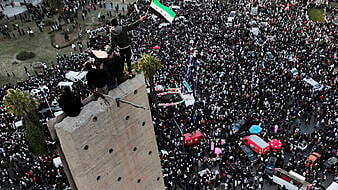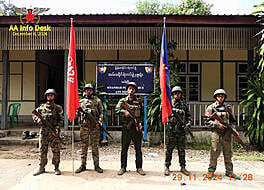A group of survivors of Nazi death camps marked the 79th anniversary of the liberation of the Auschwitz-Birkenau camp during the Second World War in a modest ceremony on Saturday in southern Poland.
About 20 survivors from various camps set up by Nazi Germany around Europe laid wreaths and flowers and lit candles at the Death Wall in Auschwitz, where the Nazis executed thousands of inmates, mostly Polish resistance members and others.
Later the group, along with state officials and other participants gathered for a ceremony by a brick women’s barrack at Birkenau that has recently undergone conservation.
Next, they prayed and lit candles at the monument in Birkenau, near the crematoria ruins.

They were remembering about 1.1 million camp victims, mostly Jews. The memorial site and museum are located near the city of Oswiecim.
Observances were also held in many other countries Saturday.
Nearly six million European Jews were killed by the Nazis during the Holocaust — the mass murder of Jews and other groups before and during World War II.
Marking International Holocaust Remembrance Day, the survivors were accompanied by Polish senate speaker Malgorzata Kidawa-Blonska, culture minister Bartlomiej Sienkiewicz and Israeli ambassador Yacov Livne.

The theme of the observances was the human being, symbolised in simple, hand-drawn portraits.
They were meant to stress that the horror of Auschwitz-Birkenau lies in the suffering of people held and killed there.
Holocaust victims were commemorated across Europe.
In Germany, where people put down flowers and lit candles at memorials for the victims of the Nazi terror, Chancellor Olaf Scholz said that his country would continue to carry the responsibility for this “crime against humanity”.

He called on all citizens to defend Germany’s democracy and fight antisemitism, as the country marked the anniversary of the liberation of Auschwitz.
“Never again is every day,” Mr Scholz said in his weekly video podcast. “January 27 calls out to us: Stay visible! Stay audible! Against antisemitism, against racism, against misanthropy – and for our democracy.”
Ukrainian president Volodymyr Zelensky, whose country is fighting to repel Russia’s full-scale invasion, posted an image of a Jewish menorah on X, formerly known as Twitter, to mark the remembrance day.
“Every new generation must learn the truth about the Holocaust. Human life must remain the highest value for all nations in the world,” said Zelensky, who is Jewish and has lost relatives in the Holocaust.
“Eternal memory to all Holocaust victims,” Zelenskyy tweeted.
In Italy, Holocaust commemorations included a torchlit procession alongside official statements from top political leaders.
Italian premier Giorgia Meloni said that her conservative nationalist government was committed to eradicating antisemitism that she said had been “reinvigorated” amid the Israel-Hamas war.
Ms Meloni’s critics have long accused her and her Brothers of Italy party, which has neo-fascist roots, of failing to sufficiently atone for its past.
Later on Saturday, leftist movements planned a torchlit procession to remember all victims of the Holocaust — Jews but also Roma, homosexuals and political dissidents who were deported or exterminated in Nazi camps.
Police were also on alert after pro-Palestinian activists indicated that they would ignore a police order and go ahead with a rally planned to coincide with the Holocaust commemorations.
Italy’s Jewish community has complained that such protests have become occasions for the memory of the Holocaust to be co-opted by anti-Israel forces and used against Jews.
The Nazis, who occupied Poland from 1939-1945, at first used old Austrian military barracks at Auschwitz as a concentration and death camp for Poland’s resistance fighters.
In 1942, the wooden barracks, gas chambers and crematoria of Birkenau were added for the extermination of Europe’s Jews, Roma and other nationals, as well as Russian prisoners of war.
Soviet Red Army troops liberated Auschwitz-Birkenau and the surviving inmates on January 27 1945.
Since 1979, the Auschwitz-Birkenau site has been on the Unesco list for sites of World Heritage.







